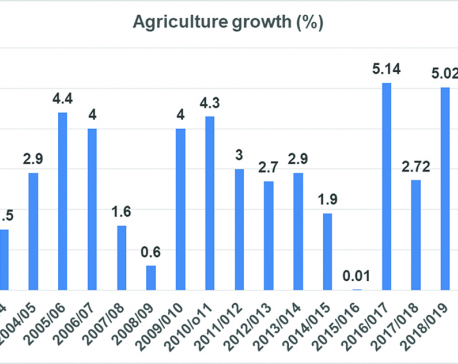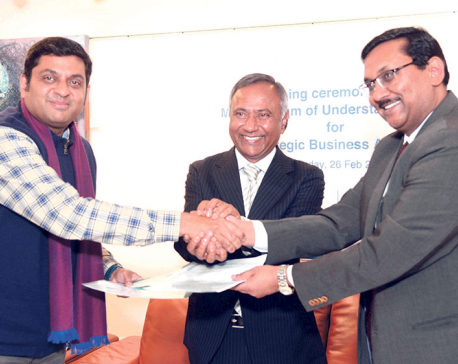
OR


Pratima Sharma
The author is a diplomat at Ministry of Foreign Affairs, Government of Nepalnews@myrepublica.com
More from Author
Lack of employment opportunities within Nepal has forced many Nepali women to move to foreign lands, where they get trafficked
Political transformation of Nepal from a decade-long war-torn nation to a modern democratic republic was not effortless. It happened at the cost of blood, sweat and tears of Nepalis. Now we have the new constitution and the governments in all three levels. But common people haven’t felt the change due to a lot of social problems. Human trafficking is one such serious problem.
The United Nations defines human trafficking as “recruitment, transportation, transfer, harboring or receipt of persons, by means of the threat or use of force or other forms of coercion, of abduction, of fraud, of deception, of the abuse of power or of a position of vulnerability or of the giving or receiving of payments or benefits to achieve the consent of a person having control over another person, for the purpose of exploitation.” Studies show it is the second largest and the fastest growing criminal industry in the world with as many as 27 million individuals living in slavery-like conditions.
Nepal is no exception. Nepalis are being sold, used, forcefully transferred, tortured and exploited through trafficking, forced labor, debt bondage, child labor etc in as well as outside Nepal. The saddest thing is most Nepalis are entrapped into this nexus mainly due to their own friends and relatives.
Majority of trafficking victims in Nepal are women and girls, who are vulnerable due to limited economic opportunities, illiteracy or low education, and low socioeconomic and cultural status. Victims come from all areas, but traditionally disadvantaged and marginalized groups such as Dalits and ethnic minorities suffer the most.
Several socio-economic factors have compelled our daughters and sisters to be trafficked to India, Saudi Arabia, Qatar, Kuwait and Malaysia. Women and girls are still taken as puppets for sexual pleasure. They get sold in the brothels and are forced to serve as prostitutes. It also comes out in the news sometimes that poor women from villages are used for surrogacy (which is illegal in Nepal).
Other victims are unemployed, illiterate and unskilled people who get deceived with promises of better jobs in and outside the country. Even literate people fall for trafficking trap when they fall for greed for higher income and sophisticated lifestyle for which they fake marriages and make fake documentations to stay in foreign countries.
Countries like Nepal are facing trafficking problem mainly because of lack of courage to speak out for right to employment. Lack of employment opportunities within their own land has forced them to move to foreign lands, where many of them get trafficked.
Make the move
Nepal has taken some measures against trafficking. Our constitution has granted right to equality and right to freedom from exploitation to the people. New Criminal Code, Nepal Labor Act, Human Trafficking and Transportation Control Act and National Human Rights Commission Act are in place with strong provisions against trafficking.
The Ministry of Women, Children and Senior Citizen and Ministry of Home Affairs deal with issues of trafficking of women and children. Other ministries are also coordinating with each other in this regard. National Human Rights Commission has also been consistently raising this issue. Nepal is party to various international conventions and laws to prevent trafficking. But trafficking is still flourishing.
Thus we need additional measures and greater commitment to stop this scourge. All the laws, rules, conventions and directives that we have should be strictly implemented. Traffickers can use various means, including advanced technology and other illegal channels, to victimize public. Thus we need to forge international coordination and bilateral, multilateral, regional and global collaboration to minimize the impacts.
Mostly Nepali women and girls are trafficked to India through various border points. There should be an enquiry committee that can wisely screen every traveler at every possible entry route. Traffickers often use fake identity cards. In this connection, it’s good news that Nepal government has started to dole out digital identity cards to Nepalis. Hopefully it will help prevent an easy escape of culprit through the borders.
Majority of women in Nepal have been denied the rights and opportunities because of gender discrimination, caste discrimination, poverty, corruption, unemployment and illiteracy. Hence, women empowerment activities should be carried out more than ever. There are several non-profit organizations opened to rescue trafficked women. If they collaborate with Nepal Police a lot could be accomplished. If we open rehabilitation centers and make them accessible to all those who need, it would help restore social dignity of girls and women who were once trafficked and who want to get back to their normal life.
Let’s make documentaries and movies based on gender equality, girl’s education, human rights and trafficking and show them to the people in remote areas where girls are extremely vulnerable to trafficking.
We have a stable government at the moment. It should focus on minimizing human trafficking. Until we create employment opportunities within Nepal, Nepalis will be deceived in the name of foreign employment.
Proper implementation of laws, raising awareness, augmenting employment opportunities could go a long way in controlling human trafficking. With collective efforts, we can create a safe and compassionate society, for girls, women and men.
The author is a diplomat at Ministry of Foreign Affairs, Government of Nepal
You May Like This

The Israeli Model of Agriculture: Lessons for Nepal
Nepal has been called an agricultural country for the past several centuries. However, this seems to be limited only to... Read More...

Erratic pattern
Agriculture in Nepal is suffering from years of under-investment, limited research, scant inputs and lack of technology and services for... Read More...

Standard Chartered Bank Nepal, Nepal Mediciti join hands
KATHMANDU, Mar 1: Standard Chartered Bank Nepal Ltd (SCBNL) and Nepal Mediciti have signed an agreement to provide various discounted... Read More...




Just In
- MoHP cautions docs working in govt hospitals not to work in private ones
- Over 400,000 tourists visited Mustang by road last year
- 19 hydropower projects to be showcased at investment summit
- Global oil and gold prices surge as Israel retaliates against Iran
- Sajha Yatayat cancels CEO appointment process for lack of candidates
- Govt padlocks Nepal Scouts’ property illegally occupied by NC lawmaker Deepak Khadka
- FWEAN meets with President Paudel to solicit support for women entrepreneurship
- Koshi provincial assembly passes resolution motion calling for special session by majority votes







_20220508065243.jpg)






Leave A Comment